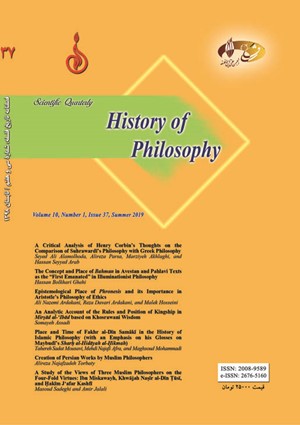Epistemological Place of Phronesis and its Importance in Aristotle’s Philosophy of Ethics
Subject Areas : Philosophical thoughts in ancient IranAli Nazemi Ardakani 1 , Reza Davari Ardakani 2 , Malek Hosseini 3
1 -
2 - University of Tehran
3 -
Keywords: Phronesis practical wisdom Sophia theoretical wisdom practico-ethical wisdom,
Abstract :
Phronesis or practical wisdom is one of the intellectual virtues which Aristotle has defined as a predisposition for continuously becoming involved in practice while thinking wisely about good and evil affairs. The outcome of this predisposition or phronetic act is the product of a kind of philosophical thinking which, in addition to viewing certain established principles, attends to madīna (polis) as a cradle for the development of acts; to finite, particular, and changing affairs as the subject of knowledge, and to Man as a free agent. The irregularity and, at the same time, legitimacy of phronesis provides individuals with a strategy not to surrender to fixed and strict scientific laws as the only legitimate tools of knowledge acquisition. Through making a methodological distinction between sophia or theoretical wisdom and phronesis, Aristotle has in fact founded the independence and irreducibility of practico-ethical knowledge about what is correct; practical deliberation cannot be reduced to logical arguments. In Aristotle’s ethical philosophy, accidental knowledge, as the knowledge of finite, particular, possible, and changing affairs, is a complement to essential knowledge, which pertains to pre-eternal and universal affairs and primal and fixed basic principles. Sophia and phronesis can lead to happiness only in case they function as the two sides of the same coin.
ارسطو (۱۳۸۹ الف) اخلاق نیکوماخوس، ترجمة محمدحسن لطفی، تهران: طرح نو.
ارسطو (۱۳۸۹ب) متافیزیک، ترجمة محمدحسن لطفی، تهران: طرح نو.
داوری اردکانی، رضا (۱۳۹۵) اخلاق در عصر مدرن، تهران: سخن.
راینر، هـ . (۱۳۹۴) «اتس»، فرهنگ¬نامه تاریخی مفاهیم فلسفه، جلد سوم: فلسفه اخلاق، زيرنظر محمدرضا بهشتی و بهمن پازوکی، تهران: مؤسسة پژوهشی حکمت و فلسفة ایران.
ریتر، ی. (۱۳۹۴) «اخلاق»، فرهنگ¬نامه تاریخی مفاهیم فلسفه، جلد سوم: فلسفه اخلاق، زيرنظر محمدرضا بهشتی و بهمن پازوکی، تهران: مؤسسة پژوهشی حکمت و فلسفة ایران.
فونکه، گ. (۱۳۹۴) «اتس»، فرهنگ¬نامة تاریخی مفاهیم فلسفه، جلد سوم: فلسفه اخلاق، زيرنظر محمدرضا بهشتی و بهمن پازوکی، تهران: مؤسسة پژوهشی حکمت و فلسفة ایران.
قوام صفری، مهدی (۱۳۹۲) «نوس: دانش عملی برهان¬ناپذیر و ملکة معرفتی ارسطو»، نشریه فلسفه، شماره ۲، ص46ـ 29.
كريستوا، ژوليا (1396) هانا آرنت؛ زندگي روايت است، ترجمة مهرداد پارسا، تهران: نشر شوند.
کمالی، سید مجید (۱۳۹۶) تفسیر پدیدارشناسانه هایدگر از اخلاق نیکوماخوس؛ مطالعه انتقادی، پایاننامه دکترا، گروه فلسفه، دانشکده ادبیات و علوم انسانی، دانشگاه اصفهان.
Aristotle (2009). Nicomachean ethics (D. Ross, Trans.). Oxford: Oxford University Press.
Curnow, T. (2011). Sophia and Phronesis: Past, present, and future. Journal of Research in Human Development, 8, 95-108.
Long, C. P. (2002). The ontological reappropriation of phronesis. Journal of Continental Philosophy Review, 35, 35-60.
Surprenant, C. W. (2012). Politics and practical wisdom: Rethinking Aristotle’s account of phronesis. Topoi: An International of Review of Philosophy. 31, 221-227.


